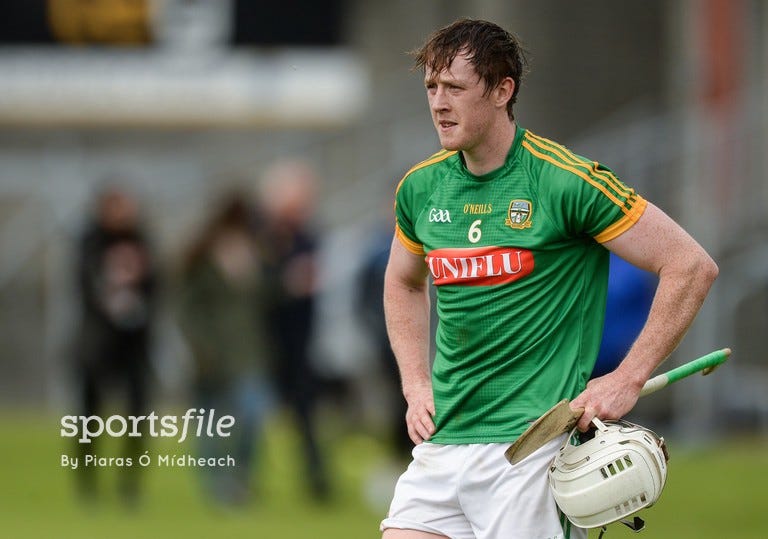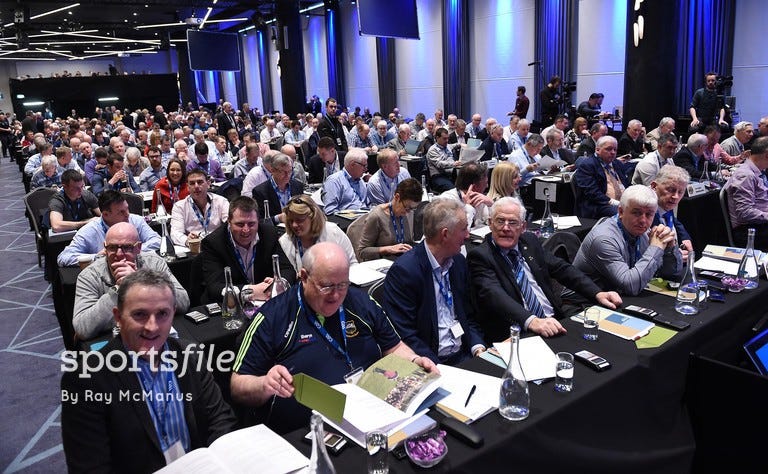Little time for also-rans as the Championships get underway, four weeks after they start
After the second week of June, there might be no hurling at all in the northern half of the country.
After the second week of June, there might be no hurling at all in the northern half of the country.
It’s so predictable you could almost set your watch by it. Second or third Sunday in May, complete with slick and uplifting RTE montage. The heartbeat of the Irish, the sign that summer has arrived... Preceded a week or two earlier by the blanket newspaper coverage. It’s Happening. The Championships Are Coming.
The premise is largely fair, of course. Little glues the Irish sports commentariat more than GAA championship season. And, where the hurling championship — generally lauded as being somehow more Irish — only includes 14 counties, the football counterpart is literally open to all comers. There remains a romance, a possibility that the Sligos or Tipperarys of the world can strike an unexpected a vein of form, and boom: it’s Croke Park in August, and the smell of Sam McGuire is in the air.
That premise only goes so far though, and it unveils a strange hypocrisy the major press. Football gets covered from its opening Sunday, the ritual near-but-far of New York losing in Connacht, right the way through to September. Hurling gets covered from… sometime later.
Imagine if I told you that there had already been a Championship hurling match this summer, a simmering rivalry between two bordering local rivals, where there were 41 scores and the winners won by a single point. You’d probably wonder if you’d missed the opening round of the Munster championship.
But no: there was such a game. It took place on Saturday the 22nd of April, and Fermanagh beat Leitrim by 5–13 to 2–21. It’s fair enough that you probably hadn’t heard of it. There are no match reports to say how many people showed up. You can’t even be sure that the scoreline was read on the Six One News.
But, you might say. That’s not the Championship. Fermanagh and Leitrim can’t win the All-Ireland.
Perhaps not. They cannot win the All-Ireland. But they can win an All-Ireland. They can win the only All-Ireland available to them, in the only Championship they’re allowed to enter.
It’s a rare GAA manager whose first thought is for his opposition — but Westmeath’s Michael Ryan had barely begun a post-match interview on Sunday before offering some sympathy for Meath, the team just dumped out of the Championship by his own charges.
Westmeath had just won by two points, and would be drawn against Offaly in the quarter-finals of the Leinster Championship ‘proper’. Meath, by virtue of points difference in the round-robin stage, were relegated back to the Christy Ring Cup (of which they are the reigning champions). In injury time Meath were trailing by three and hit a long-distance free over the bar; dropping it short might have a resulted in a goal that would draw the match and see Meath progress while Westmeath would be relegated. The entire landscape of their summers hinged on the striking of a single ball. That’s the way good, gripping sport tends to be.

And yet, Ryan opened a post-match interview with a note of sorrow and sympathy. “My first thought is for the two teams, Kerry and Meath, who are out of the Championship today,” he said, having been asked a completely unrelated question by Newstalk’s Oisin Langan.
“It isn’t about getting competitions out of the way. There’s got to be some structures in place, that counties are playing hurling in the summer months.”
Meath (disclosure: my own county) played nine competitive games in 2017, but their year is finished by the second weekend in May. Kerry likewise. And they are at the hallowed ‘top table’. The Louth hurlers got eight games — all of them, by coincidence, involving fairly short trips against Ulster teams — but were discarded to the Championship scrapheap by the end of April. Hurling has done a remarkable job of giving its teams a decent fistful of games to play, and a terrible job of rationing the supply to last the summer.
By the time Kilkenny and Limerick make their Championship debuts, on the second Sunday of June, 20 of the GAA’s 35 inter-county hurling teams will already have finished up for the year. The media machine will barely have reached full tilt, and two-thirds of the country will have hung up their hurls.
It wasn’t always this way. When the lower-tier competitions were first invented, they were supposed to be played later in the season. Westmeath won the first Christy Ring Cup in 2005, beating Down by two points. The game was the curtain raiser to a ‘senior’ All-Ireland semi-final.
But in the intervening years — and nobody is sure why — they have been shifted earlier and earlier into the season. The finals now take place as a triple-header on the second weekend of June. Even the counties that ‘succeed’ — the ones that break through the ranks and strive to better themselves, to spread the hurling gospel to new parts — are finished, and must sit around while The Proper Hurling takes place. You know, the one where the actual teams play?
This year the GAA’s governing Congress popped the cherry on top. The winners of the Christy Ring Cup are now guaranteed a slot in the qualifier series for the Liam MacCarthy in the same year. The procession was complete: the lower-tier competitions must now be finished by early June, so that the winner is ready to take part in a back-door match two weeks later. Sorry lads, rules is rules.
Never mind that nobody had argued for this to be made available. Never mind that a 2015 survey of the participating players found major appetite to spread the games out over the summer, with the finales at the same time as everyone else’s.
An anonymous member of the GAA’s Ard Comhairle proposed it, and Congress (the same Congress that created a football Super 8 which the supporters want, and the players don’t) sleepwalked into it.
And so we have the unlikely vista of a manager steering his team into knock-out hurling, but whose first thought is for the defeated rivals, who will be waiting 39 weeks for another bite of competitive action.
Imagine a map of Ireland, with a straight line drawn between Dublin and Galway. After the second week of June, there might be no senior inter-county hurling at all — at all — in the northern half of the country. The only hope for small ball salvation is that Antrim win the Christy Ring Cup and get parachuted into the All-Ireland Qualifiers, where the exhausted Saffrons would have to play their 13th competitive game of the season.
They’ve already played eight; they’re allowed to win the All-Ireland as long as they can win another eight in a row. GAA Equality is where Kilkenny or Limerick can win an All-Ireland playing four games, and Antrim or Carlow can get there as long as they can win ten.
But then again, that’s just The Way Things Are. The lower-tier competitions are airbrushed out of existence — omitted from the snazzy, intoxicating RTE montage packages; barely mentioned even in the GAA’s own annual reports — and banished from television except for a solitary Saturday on TG4.
When an impressionable seven-year-old north of that Dublin-Galway axis gets to see Championship hurling on telly, and wants to go and see their own county, they’ll be met with a passive sniff and told, Sorry, kid, there’s nothing for you here. Try again in nine months.
Second thoughts, immune even from re-runs, in a world where The Championships exist only to feed the next glossy RTE montage, and where the summer exists only on TV.



